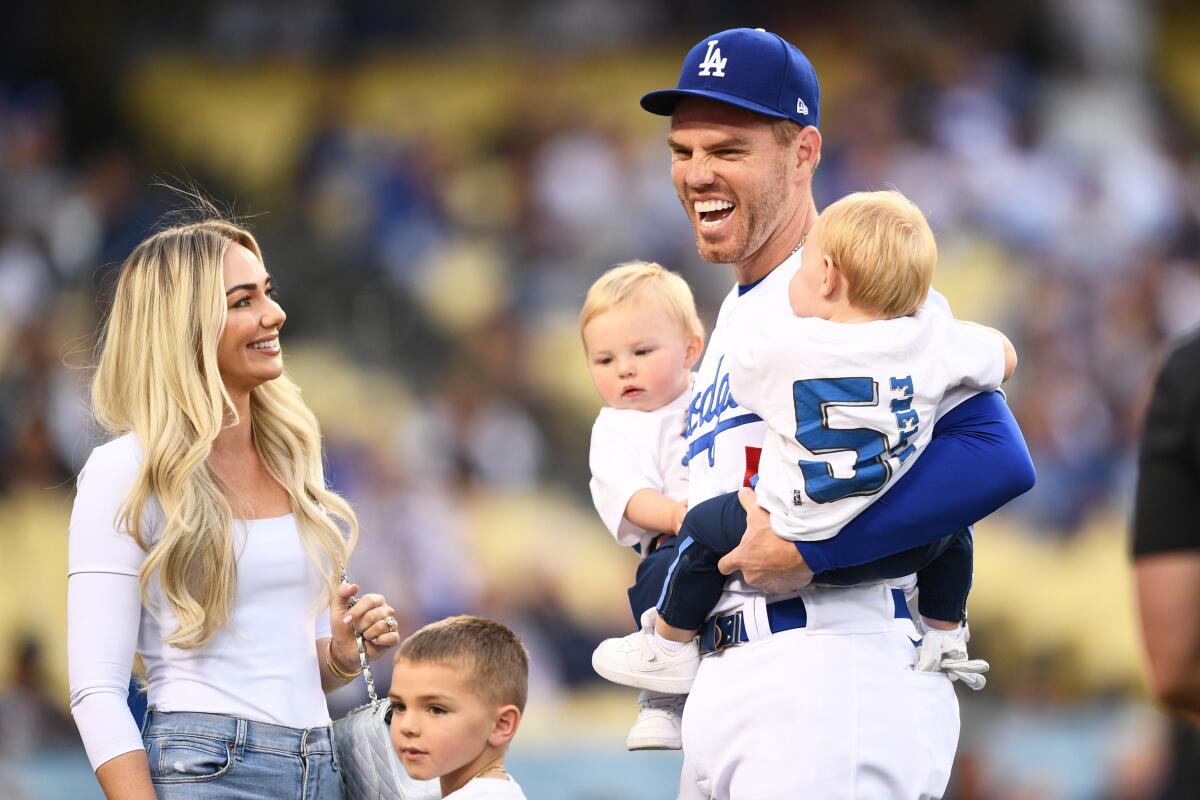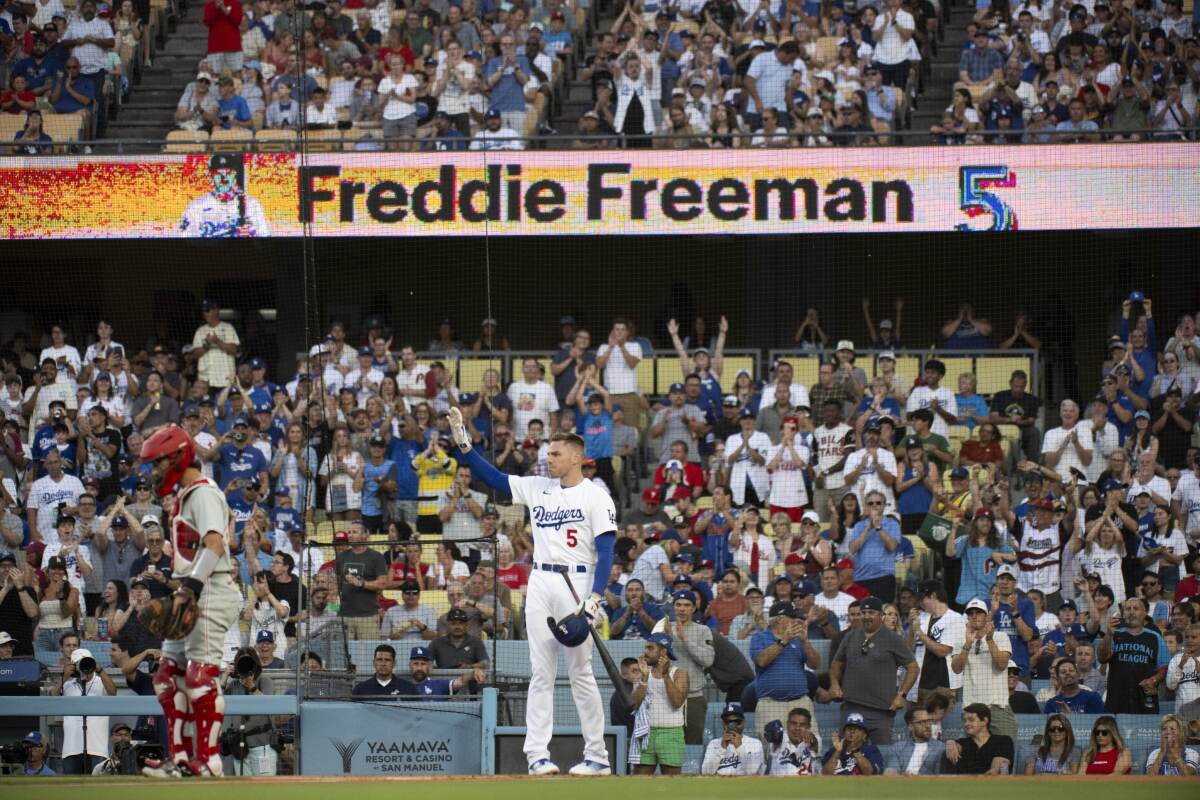Back with Dodgers, Freddie Freeman details son’s ‘heartbreaking’ fight for life

- Share via
Freddie Freeman was equipped with a towel as he walked into a Dodger Stadium interview room Monday afternoon. An emotional sort in the best of times, the veteran first baseman knew he wouldn’t get a minute into recounting the brutal ordeal his 3-year-old son, Maximus, went through over the last two weeks without crying.
He was right … and he didn’t care. The tears flowed, and so did the gratitude of an eight-time All-Star who returned after an eight-game absence, his son home from the hospital and on a long but hopeful road of recovery from Guillain-Barré syndrome, a rare neurological condition in which the body’s immune system attacks the nerves.
“Max is doing all right … but he’s got to relearn how to do pretty much everything,” Freeman said, pausing several times to rub his eyes and collect his thoughts. “Terrible syndrome, Guillain-Barré … but it’s a good thing I’m here, because it means things are trending better. No one should have to go through this, especially with a 3-year-old.”
Freeman and his wife, Chelsea, noticed Max walking with a limp on the morning of July 22, a Monday, and by that night, Max couldn’t walk. The symptoms, according to visits with several doctors, were consistent with transient synovitis, which can cause a pain in the hip after a viral infection.
By that Tuesday, Max couldn’t sit up, and by Wednesday night, July 24, while Freeman was playing a home game against the San Francisco Giants, Max had stopped eating and drinking and was taken to the emergency room. Doctors still suspected transient synovitis and recommended Tylenol. Max was discharged at 3:30 a.m.
Freeman played a day game against the Giants on about an hour of sleep that Thursday and traveled — somewhat reluctantly — with the Dodgers to Houston that night for the start of an eight-game, three-city trip.
Fans give an appreciative Freddie Freeman a lengthy standing ovation after his return to Dodgers following son’s hospitalization.
“I called Chelsea on Facetime and said, ‘I don’t know if I should be leaving right now,’ ” Freeman said. “Something was off. It just felt wrong to leave. But we did just because [we thought] it would be OK.”
Things were not OK. Freeman had gone through his normal pregame routine in Houston’s Minute Maid Park that Friday before joining Max’s visit to a pediatrician via Facetime.
“And thankfully, that pediatrician said, ‘You need to go to the hospital now — this is not transient synovitis,’ ” Freeman said. “They were ready to call an ambulance for him, because they didn’t think he was going to be able to breathe that long … so I immediately told Scott [Akasaki, traveling secretary] to help get me home.”
With Max having “rapidly declined,” according to an Instagram post from Chelsea, he was rushed to the emergency room at Children’s Hospital of Orange County, “and within 2 ½ hours, he had a ventilator in,” Freddie Freeman said.

A paralysis began to drift upward, from Max’s feet toward his waist and then his shoulders, which was affecting his diaphragm and his breathing. Freddie arrived at the hospital at about 10 p.m., his youngest son hooked up to a ventilator and feeding tube.
“My 3-year-old son needing help to breathe, when five days earlier, he was doing front flips,” Freeman said, when asked to recall the toughest part of the ordeal. “You just wish you could switch. You really do. Like, I’ve been through a lot in my life. I lost my mom when I was 10, but you can’t really compare any of this because both are awful.
“But seeing your kid fighting for his own life when there’s nothing he or anybody else could do. His immune system started attacking his own nerves, and that’s the heartbreaking thing. He can’t breathe on his own, he’s on a ventilator, that was hard.
“I know Dodgers fans wouldn’t like this, but I would gladly strike out with the bases loaded in the bottom of the ninth inning in Game 7 of the World Series 300 million times in a row than to see that again.”
There was encouraging news, though, when doctors diagnosed Max with Guillain-Barré and immediately started IVIG (intravenous immunoglobulin) treatments, which are made from donated plasma that contains healthy antibodies to help stop the harmful antibodies from damaging the nerves. Max responded well to two rounds of IVIG.
“He was starting shoulder-shrug, which was a massive sign for us, because that means, so paralysis starts from your toes up, so now [when it recedes] it goes top to bottom,” Freeman said. “It was starting to move back down, which was huge.”
Max’s condition continued to improve early last week, so much so that within 48 hours of experiencing full-body paralysis, he was excavated from his breathing tube and taken off a ventilator.
“It was [last] Wednesday at 10:46 p.m., I’ll never forget — he had his ventilator pulled, and within six minutes, he was sitting on me,” Freeman said. “I can’t tell you how good that felt, to be able to hold my son again. That was a special time, just knowing how hard he fought in those five days.
“When he was born, we were trying to figure out a name. We had two kids at that time, and Chelsea came upon ‘Maximus.’ I was like, ‘That’s a strong name.’ I said I didn’t know it was gonna have to be proved true within four years of his life, with how strong this little boy is.”
Freeman, who had started every one of the team’s first 104 games, missed the entire trip in which the Dodgers lost five of eight games at Houston, San Diego and Oakland. But when Max came home from the hospital on Saturday, Freeman could breathe a little easier.
“I mean, if you talked to me six days ago, I would never have been able to speak to you guys, I just couldn’t,” Freeman said. “But the reason I’m able to get through this is because of the huge wins we’ve been getting the last few days with him. It’s been a miraculous recovery. That’s what they say to us.”
Freeman went through rigorous workouts at his old high school, El Modena in Orange, on Saturday and Sunday and felt like he was ready to return on Monday. Greeting him were teammates and coaches who wore #MaxStrong shirts with No. 5 Freeman on back during batting practice before the series opener against the Philadelphia Phillies.
“I don’t know whose idea it was, but that was the first time I cried today, when I walked in and saw those,” Freeman said of the T-shirts. “It means a lot. The support from this organization has been … there’s no words. I can’t even put it into words, really. Things happen. I’m just so glad that he was able to be at CHOC.
“Dr. [Jason] Knight and his staff in the [pediatric intensive care] unit. The nurses day and night, absolutely incredible. The respiratory therapists, neurology, every department. I mean, I’m here nine days after, and it feels like a miracle, it really does. I can’t thank them enough.”
Freeman was among the team’s hottest hitters when he left the team, and he entered Monday night’s game with a .288 average, .888 on-base-plus-slugging percentage, 16 homers, 26 doubles and 67 RBIs on the season.
In his absence, a Dodgers offense that was already playing without the injured Mookie Betts and Max Muncy hit only .213 (65 for 301) on the eight-game trip, the fourth-worst average in baseball in that span.
But Freeman was back in the Dodgers lineup, batting third and playing first base, on Monday night, a little rusty but buoyed by the knowledge that 3-year-old Max would be at home watching Daddy on television.
“My brain is still a little mushy — not much sleep for mom and dad and the rest of the family — but we’re hanging in there,” Freeman said. “We’ve been told [Max] is going to make a full recovery. We just don’t know how long it’s going to be. But the prognosis of recovery is good.”
More to Read
Are you a true-blue fan?
Get our Dodgers Dugout newsletter for insights, news and much more.
You may occasionally receive promotional content from the Los Angeles Times.











